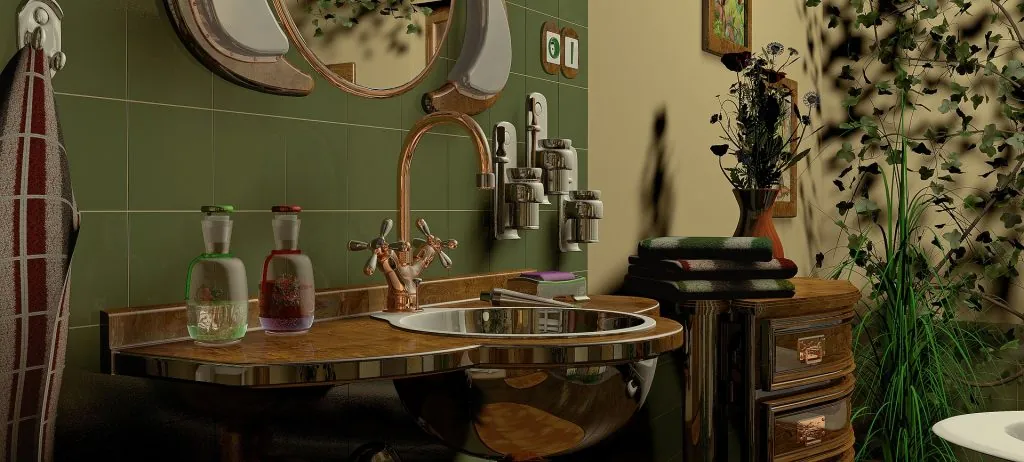Feeling Stuck? A Different Way To Handle Monotonous Repetition

A bathroom meditation.
Have you ever just had one of those days where you ask yourself, What just happened?
You’re exhausted, but have nothing really tangible to show for your efforts that day. Because for the past few weeks, months, years or decades you’ve been pouring your life force into cleaning, grooming dressing, and toileting someone else in addition to yourself.
When you have a child with special needs, who depends on you for even these most basic of tasks, you may have many of these days.
It’s easy to fall into despair and feel that things will never change.
During these times, your life may seem frozen like a prehistoric bug trapped in amber.
I have had that feeling many times over the years—especially during the early years. Or even now when I’m tired and must take my teenage son, Jack, to the bathroom for the umpteenth time that day.
On some days Jack doesn’t want to go, yet doesn’t want to leave the bathroom either. You know what I mean. You live it too.
And it’s always right before a bathroom trip that I see pictures of someone else’s fabulous vacation. Or hear about someone else’s concrete personal triumph—a marathon won, a degree earned, a promotion accepted.
Usually I’m happy for other people’s good news, but when I’m tired and cranky, jealousy can worm its way through my heart and eat at my soul.
There was a time, maybe 10 years ago, when I could barely contain my solo pity party. My friends with their typically developing children were leaving their potty-training, diaper changing days behind and were getting their groove back.
(Or that’s how I saw it while I perched on the tub (next to the toilet) encouraging Jack to try one more time.)
There were some days I’d even calculate how long I spent that day in the bathroom, and feel depressed by the answer.
It’s so easy to fall into a rut of despair. You might even at times silently resent your child, whom you love so much and would gladly give your life for.
The reality is, you might very well be managing your child’s life physically (by caregiving), or mentally (by overseeing those who do), until you yourself need assistance caring for yourself (if you live that long).
We can use this harsh truth to consume us with existential gloom, or we can do what is in our control.
How?
The first step towards inner peace with our journey is to change how we view the repetitious, mundane, yet necessary tasks of caregiving.
I have had plenty of time to meditate on such things. In fact, much of what you read in my blog comes from reflections during my hours of mind-numbing vigil in the bathroom.
Over the years, I’ve evolved from thinking about caregiving as a prison sentence of sorts (for a crime I didn’t know I committed), to a far-less charged, bitter and desolate interpretation.
It was when I stumbled upon the bricklayer story years ago that I began the shift in my perspective.
The Story of 3 Bricklayers
“Once there were 3 bricklayers. Each one of them was asked what they were doing.
The first man answered gruffly, ‘I’m laying bricks.’
The second man replied, ‘I’m putting up a wall.’
But the third man said enthusiastically and with pride, ‘I’m building a cathedral.’”
–Author Unknown
I can think about the caregiving jobs my husband Mike and I must do for Jack as Sisyphean tasks extending out towards infinity, or I can choose to look at these things a different way. I know that when we take Jack to the bathroom for his needs, he will come out clean, dry and comfortable.
It doesn’t look as glamorous as the big parenting wins often dramatized on social media. It’s just a tiny victory of fighting the inertia within ourselves to move from the couch yet again and take care of business. And this triumph is a bit of grace that we can give to ourselves when no one is looking.
Our tasks can be looked at as an unfair curse brought down upon ourselves and our children by an unfeeling God, or we can see these responsibilities as tangible reminders of our love.
Some days will feel bad no matter our outlook and we will do what we can to survive those times. But when we wake up the next morning, let’s see it as a fresh start to manage our expectations of ourselves and take pride in our caregiving.
Many people would die for their children, including us. How about we turn this sentiment around and really live for them too? Let’s view the small, monotonous, daily chores we do as actions of love.
What we must do every day absolutely has a larger meaning. Just ask the third bricklayer.
(I need to go now. Duty calls.)
It is the small things in life which count; it is the inconsequential leak which empties the biggest reservoir.
Charles Comiskey
